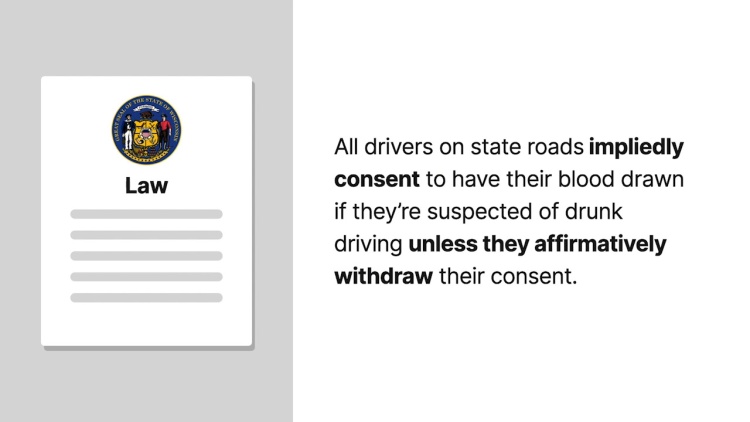Mitchell v. Wisconsin
United States Supreme Court
139 S.Ct. 2525 (2019)
- Written by Rose VanHofwegen, JD
Facts
A witness reported that Gerald Mitchell (defendant) was driving drunk to police. Officers found Mitchell slurring and stumbling. A portable breathalyzer registered his blood-alcohol content (BAC) at triple the legal limit. Police transported Mitchell to the station to administer an evidence-grade breathalyzer, but Mitchell had become too lethargic. Officers transported Mitchell to the hospital, but he passed out on the way. An officer read Mitchell the standard prefatory statement required before administering blood tests in Wisconsin, heard no reply, and directed hospital staff to draw a blood sample. The test showed that Mitchell’s blood-alcohol level remained almost triple the legal limit 90 minutes after his arrest. The trial court admitted the blood-test evidence over Mitchell’s objection, and the jury convicted him. Mitchell appealed on the ground that the blood test constituted an unreasonable search without a warrant in violation of the Fourth Amendment. The Wisconsin Supreme Court affirmed his conviction, but the United States Supreme Court granted review.
Rule of Law
Issue
Holding and Reasoning (Alito, J.)
Concurrence (Thomas, J.)
Dissent (Sotomayor, J.)
Dissent (Gorsuch, J.)
What to do next…
Here's why 907,000 law students have relied on our case briefs:
- Written by law professors and practitioners, not other law students. 47,100 briefs, keyed to 996 casebooks. Top-notch customer support.
- The right amount of information, includes the facts, issues, rule of law, holding and reasoning, and any concurrences and dissents.
- Access in your classes, works on your mobile and tablet. Massive library of related video lessons and high quality multiple-choice questions.
- Easy to use, uniform format for every case brief. Written in plain English, not in legalese. Our briefs summarize and simplify; they don’t just repeat the court’s language.





